 The Importance of Our Right to Vote
The Importance of Our Right to Vote
The 2020 election marked the highest voter turnout of the 21st century at 67 percent—the highest since 1900. In a country with a rich history of struggle and sacrifice for the right to vote, why do so many Americans remain disengaged?
Despite the monumental battles for voting rights, including movements for women’s suffrage and civil rights, many people still do not vote. With the 2024 election on the horizon, we will examine one factor that impacts voter turnout: the systems and laws that shape how we vote. From local and state races to the presidential election, voting laws play a critical role in who votes and how their voices are heard. We will also look at some of the less-examined issues connected to this year’s election.
Local and State Elections
Often when citizens think about voting, they’re thinking about the presidential election. However, state and local elections can have far greater effects on our lives. Questions such as public transit funding, the minimum wage, and recycling regulations are decided by state and local elections and officials.
This November, Americans across 41 states will be voting on some 160 statewide ballot measures, including measures covering the controversial question of abortion. The 2022 Supreme Court decision in Dobbs v. Jackson Women’s Health Organization overturned the landmark Roe v. Wade (1973), putting the issue of abortion and any right to privacy between a woman and her health care provider back into the hands of the states. Because of this, voters in 11 states will be telling their state government whether or not it should protect a right to an abortion. Other ballot measures voters will see in November include those regarding citizenship, electoral systems, criminal justice, policing, taxes, wages, and drug policy.
READ more about this year’s ballot measures across the country.
READ more about Dobbs v. Jackson Women’s Health Organization.
Differences Among Voting Laws
In the United States, there isn’t a federal standard when it comes to voting procedures. Instead, it is the responsibility of the states to create their own. This leads to a plethora of differences in how states run their elections.
To better understand this, let’s look more closely at voter registration laws, voter ID laws, and ranked-choice voting. States such as Pennsylvania, Louisiana, and Arizona have a strict deadline for voters to register. Other states like Virginia, Wyoming, and California don’t have a deadline and voters can register at the polling center on Election Day. When it comes to voting in person, whether early or on Election Day, 15 states do not require a voter to present a valid form of ID to vote. The states that do require voter ID differ in whether or not a valid ID must contain a photo. Other states require signature verification; if the voter signature provided doesn’t match the one on file, that vote will not be counted.
READ more about voter ID laws in different states.
How many candidates someone can vote for also differs from state to state because of a newer process in the United States known as ranked-choice voting. Ranked-choice voting allows voters to rank the candidates rather than choose just one; in the event a voter’s first choice doesn’t receive many votes, their vote then goes to their second and/or third choice. States such as Maine and Alaska have recently implemented this process in statewide elections. Some states, like Colorado and Maryland, use ranked-choice voting in local elections but others, such as Florida and Kentucky, have banned the process entirely. Although ranked-choice voting is new to the United States, countries such as Australia, Malta, and Ireland have used ranked-choice voting for over 100 years and a dozen others implemented the system prior to the United States.
WATCH to learn about the process, pros, and cons of ranked-choice voting.
Differences in How Elections Are Decided
Congressional and gubernatorial elections are decided by a popular vote, but the presidential election is decided by the Electoral College. Some Americans support this system of electing the president, which is outlined in the Constitution. Others believe it is outdated or misrepresentative of the electorate’s intent.
Under the Electoral College system, a candidate must win majority support in states across the country—in smaller, more rural states as well as in larger, more populated states. Supporters say this process ensures that a presidential candidate has broad appeal and that voters in rural areas are not ignored in favor of those in dense population centers. Detractors, however, say the system doesn’t always match the results of the nationwide popular vote and gives outsized importance to voters in “battleground” or “swing” states that could conceivably go for either candidate. This year, for example, voters in battleground states such as Pennsylvania and Georgia could be instrumental in deciding the next president.
The Electoral College system has its merits and drawbacks. But a voter’s perception of their own importance can affect their feelings about casting a ballot. However, it is still incredibly important for all of us as Americans to vote to choose our elected officials and weigh in on statewide ballot measures. This is exactly why voting matters—because the leaders and policies chosen at the ballot box shape our society in ways that affect us all.
Don’t Sit Out
As we approach the 2024 election, the differences in how our voting systems operate across states—from registration laws to voter ID requirements—can feel overwhelming at times. However, it’s vital to remember that every election, from the local to the national level, carries significant weight. While the Electoral College system may not always reflect the popular vote, each ballot cast plays a role in shaping policy and electing leaders who impact everything from education to health care to civil rights. In a democracy, voting is both a right and a responsibility. Understanding the systems that influence our elections can empower us to make informed choices and ensure our voices are heard where it counts.
Discussion Questions
- What would you say to someone who is considering not voting in this election?
- Which level of government do you think has the most impact on your day-to-day life? Why?
- If you had to choose, which of the following do you believe is the most important reason to vote?
- To fulfill your civic duty
- To weigh in on laws and ballot measures
- To have a say in local and state elections
- To have a say in federal (presidential and congressional) elections
- Is our voting system set up to best represent the will of the people? What reforms, if any, would you make to our system of elections?
- Are voting laws and processes best handled by the states or should there be some federal standards? Explain your reasoning.
As always, we encourage you to join the discussion with your comments or questions below. Close Up is proud to be the nation’s leading nonprofit civic education organization, working with schools and districts across the country since 1971. If you would like to partner with us or learn more about our experiential learning programs, professional development, or curriculum design and consulting, contact us today! Sources
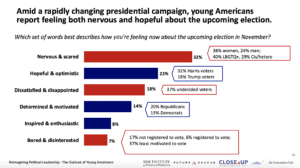 The survey’s key findings relating to the 2024 election and the presidential candidates include the following:
The survey’s key findings relating to the 2024 election and the presidential candidates include the following: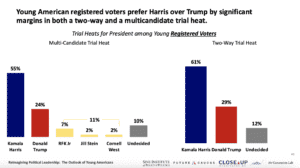 The findings also show that young Americans have more negative emotional responses to the election, with half of respondents saying that they are feeling either “nervous and scared” or “dissatisfied and disappointed.” These responses can be partially explained by the findings that majorities of young Americans agree with statements such as:
The findings also show that young Americans have more negative emotional responses to the election, with half of respondents saying that they are feeling either “nervous and scared” or “dissatisfied and disappointed.” These responses can be partially explained by the findings that majorities of young Americans agree with statements such as: What is the United South and Eastern Tribes Inc. (USET)?
What is the United South and Eastern Tribes Inc. (USET)? Conclusion
Conclusion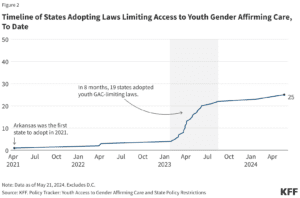 In the past six years, the introduction of bills in state legislatures to ban gender-affirming care for transgender and gender diverse youth has increased exponentially. In 2018, two such bills were introduced. In 2023, there were 185. Arkansas became the first state to ban gender-affirming care for youth in 2021; now, there are 26 states with bans on gender-affirming care for transgender youth. In response, other states have begun passing laws protecting access to gender-affirming care. It is estimated that 110,000 transgender teenagers, about 40 percent of transgender youth, live in states with bans on gender-affirming care.
In the past six years, the introduction of bills in state legislatures to ban gender-affirming care for transgender and gender diverse youth has increased exponentially. In 2018, two such bills were introduced. In 2023, there were 185. Arkansas became the first state to ban gender-affirming care for youth in 2021; now, there are 26 states with bans on gender-affirming care for transgender youth. In response, other states have begun passing laws protecting access to gender-affirming care. It is estimated that 110,000 transgender teenagers, about 40 percent of transgender youth, live in states with bans on gender-affirming care.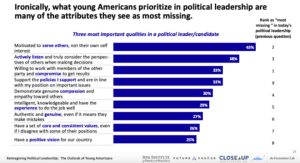 When poll participants were asked to list the three most important qualities they look for in a political candidate, they listed a motivation to serve others as the highest priority. They also said they want leaders who actively listen to and consider the perspectives of others and who are willing to compromise to get results. Interestingly, they ranked all three of those attributes above the priority of a leader supporting the policies that the poll participants support.
When poll participants were asked to list the three most important qualities they look for in a political candidate, they listed a motivation to serve others as the highest priority. They also said they want leaders who actively listen to and consider the perspectives of others and who are willing to compromise to get results. Interestingly, they ranked all three of those attributes above the priority of a leader supporting the policies that the poll participants support.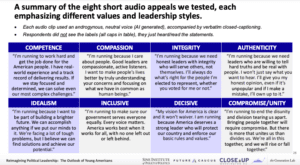 Respondents were asked to rate, on a scale of 1-10, how appealing they found each campaign pitch.
Respondents were asked to rate, on a scale of 1-10, how appealing they found each campaign pitch.






